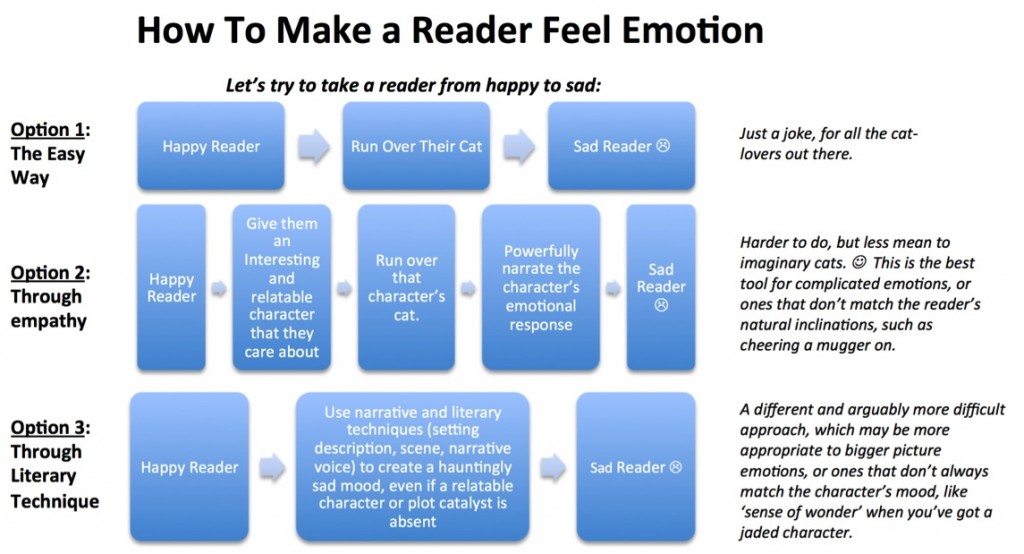
Emotion in Writing:
(Ignore the featured image for now, we’ll get to it)
Emotion in Writing is, it seems to me, an intermediate level topic in writing, and one that isn’t as obvious as it might sound. At least, it hasn’t been for me, especially given my interest in genre fiction, rather than literary (ie. I like action-packed stories, not ones that dwell on the misery of someone’s day to day life). So a few comments on the topic:
Why do you even need to consider it?
Emotion is an important consideration in writing, and is stressed as such by several writers and writing instructors that I respect, as it achieves several things:
- It makes your story more powerful and memorable, especially for people who most strongly empathize with that particular emotion.
- It helps grab and keep a reader’s attention, by introducing an emotional investment, which is harder to walk away from. Having said that, as in this post, an emotional grip on the reader is more difficult in the opening pages. Which isn’t to say that you shouldn’t plant the seeds early.
- It adds texture and depth to your writing, an additional dimension. As David Wolverton (AKA, David Farland of Runelord fame) notes, combining internal and external conflict to a story adds variety and interest.
What have more successful writers than me had to say about it?
(sourced from memory and Internet sources, so please take exact wording with grain of salt, especially as these quotes are parsed out of the context of larger discussions)
- David Farland: Writing a novel is like composing a symphony—not a symphony of notes, but a symphony of emotion
- Ilona Andrews: The key to an effective time-compressing transition is the change that takes place in the character. Think of the character’s emotions as a string. As long as you hold on to that string, you can slide all sort of beads on it.
- Orson Scott Card: You can’t control everything the reader feels, and no two members of your audience will ever be emotionally involved in your story exactly to the same degree. Still, there are some things you can control, and if you use them deftly, without letting them get out of hand, you can lead most of your audience to intense emotional involvement with your characters.
How much emotion do you need?
- This probably depends on genre and taste. And maybe format too. It seems to me that short stories play more heavily on emotion than novel-length fiction. Which is one reason that I find short stories a little harder to read one after another for an extended period, as compared to losing myself in a single book for hours. Sometimes a short story collection can feel a bit heavy handed, and even depressing. I don’t mean to be critical of short fiction here, I’ve read a lot of great stuff, but it is something I notice in that format.
- Like anything, I’m sure you can have too little or too much. And even successful authors have missed that mark. 🙂
Can ‘Fear of Getting Killed in a Messy Way’ be your emotion?
- In other words, is excitement and tension an emotion? If a policeman is hanging on top of the criminal’s car during a high speed chase, an inch from sliding off, does that create reader emotion? Fear of him dying?
- Kind of, although in a narrow way.
- I have to admit, this is a question I struggle with myself. But I think that excitement and tension is a narrower subset of emotion, that probably better fits into the discussion of Plot and Conflict, so I think I’ll defer that question for now. 🙂
Big Picture Emotions:
- David Farland (Million Dollar Ideas) has an interesting claim that readers and movie goers expect certain emotional elements in certain genres (love in romance, ‘sense of wonder’ in fantasy, etc), and that the author has to satisfy that expectation, big picture. If not, you’ll end up with a dissatisfied audience.
- I believe that this is a big picture comment, and that it makes sense to separate it from the ‘little picture’ emotions that dot a book (anger, righteous frustration, grief, shock, ect) that tend to be tied to your character’s reactions, and come from empathy with that character.
- But it’s still a very important thing to remember. If you write a fantasy without ‘sense of wonder’, you might want to rethink it!
So, how do you actually do it?
You can agree that emotion is important in writing, but never put much thought into how you’re doing it. I certainly didn’t run across a lot clear direction on this topic (although Orson Scott Card does have some good tips, which I only came across recently). Or maybe I just didn’t understand what people were telling me. But anyway, for visual folks like me, I’ve tried to break down the steps below:
Please don’t take me as the fountain of all knowledge on this one. I’m going through this exercise partly because I want to think it through myself, and improve my own skills. But maybe this framework can help you arrange your own thoughts. I think it makes intuitive sense.
I originally planned on using this framework to take you through an example, but at the moment, I’m all typed out and need to get back to some of my actual writing! 🙂 Maybe another day…
___________________________________
Life continues to make time short, but I’ve gained a bit of momentum on my editing of the old Fantasy manuscript, which I think is going quite well. My effort to look at the story through the lens of emotion has (I think) strengthened the piece considerably, and provided some of the ammunition for this post…
